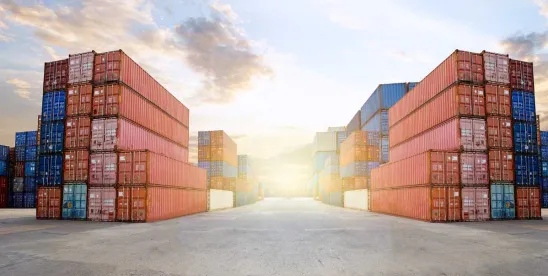Recent Developments
United States imposes new round of sweeping sanctions and export controls targeting Russia.
On June 12, the U.S. Department of the Treasury’s Office of Foreign Assets Control (“OFAC”) and the U.S. Department of Commerce’s Bureau of Industry and Security (“BIS”) issued a new round of wide-ranging sanctions and export controls against Russia, in a coordinated action leading up to the G7 summit. The OFAC sanctions target over 300 individuals and entities, strengthen secondary sanctions applicable to foreign financial institutions that engage in Russia-related transactions, and prohibit the export to Russia of certain information technology services. Relatedly, the BIS measures control the export of certain enterprise resource management software and over 500 types of physical items, and authorize BIS to designate physical addresses—in addition to legal entities—on its export-restricted Entity List.
European Union-China trade spat intensifies with European duties on Chinese electric vehicles.
On June 12, 2024, the European Commission announced that it would impose provisional duties on Chinese electric vehicles at rates up to 38.1 percent beginning July 4, in addition of the pre-existing 10 percent duty on imported automobiles. A final decision on the duties is due in November. The EU began this investigation in October 2023 to look into whether China was unfairly subsidizing Chinese EV manufacturers and causing harm to European automakers. Relatedly, the United States recently announced that it will raise tariffs on Chinese electric vehicles from 25 to 100 percent in 2024. The EU decision risks inviting retaliation from China, which has already launched a trade investigation into imports of European brandy.
G7 officials to consider actions regarding China and Russia.
As leaders of the G7 (consisting of the United States, Canada, Germany, France, Italy, Japan, and the United Kingdom) kick off a summit in Italy, the United States plans to use the gathering to establish a concerted stance against “Chinese overcapacity” as part of a larger strategy to reduce China's economic influence, and to develop an approach regarding how to “unlock the value” of frozen Russian sovereign assets to support Ukraine recovery.
U.S. considers imposing additional restrictions to limit Chinese access to AI chips.
The United States continues its push to restrict China’s access to certain chip technology used for artificial intelligence (“AI”). Reports suggest that new export controls, if approved, could target gate-all-around (“GAA”) transistors, which help to optimize chip performance and reduce power consumption.
Chinese tech firms encouraged to buy local.
The Beijing Municipal Bureau of Economy and Information announced subsidies for technology firms that purchase domestically produced artificial intelligence chips instead of foreign-made products. As the United States continues to weigh more restrictions against Chinese access to U.S. made chips, the subsidies signal China’s renewed attempt to decrease reliance on U.S. products.
United States, United Kingdom discuss collaboration on export controls and investment screening.
U.S. National Security Advisor Jake Sullivan and his UK counterpart Tim Barrow co-chaired meetings to discuss progress on the June 2023 Atlantic Declaration on joint U.S.-UK economic partnership. Officials discussed a range of initiatives, including promoting U.S.-UK leadership in quantum, artificial intelligence, and biotechnology, and implementing export controls and inbound and outbound investment screening “to protect sensitive technologies from actors that may use them to undermine each countries’ national security.”
Pause on solar duties expires.
On June 6, a two-year moratorium expired on tariffs on solar panels imported from Southeast Asia. The Biden Administration paused the duties to minimize disruptions to solar installations and allow a smooth transition to the use of domestically produced panels. Reports indicate that developers of U.S. solar projects may have stockpiled approximately a year’s worth of solar panels for their projects. Under the terms of the duty freeze, they now have six months to use that supply or else they must pay the excused duties. As previously reported, the Administration has been looking at other trade actions that could impact imports of solar panels.
United States adds Chinese companies to Uyghur Forced Labor Prevention Act (“UFLPA”) Entity List.
The U.S. Department of Homeland Security (“DHS”) designated 29 Chinese companies on the Uyghur Forced Labor Prevention Act Entity List (“UFLPA Entity List”) based on suspected links to forced labor practices in the Xinjiang Uyghur Autonomous Region, an action nearly doubling the size of the list. DHS first designated 26 Chinese textile companies, then later added companies in the footwear, seafood, and aluminum industries. As a result of the designations, there is a rebuttable presumption that the companies’ products are made from forced labor and thus ineligible for import into the United States.
China and Russia tout “new era” of partnership.
Russian president Vladimir Putin and Chinese president Xi Jinping issued a joint statement declaring a “new era” for their partnership, emphasizing their shared view on issues concerning Taiwan, Ukraine, and North Korea, and identifying plans to enhance cooperation. The joint statement accused the United States of “think[ing] in terms of the Cold War and [being] guided by the logic of bloc confrontation.”
Russia responds to U.S. legislation authorizing seizure of Russian assets.
Russian president Vladimir Putin signed a decree authorizing confiscation of assets from U.S. companies and individuals in compensation for any Russian assets that U.S. authorities may confiscate. The decree follows enactment of the U.S. Rebuilding Economic Prosperity and Opportunity for Ukrainians Act (“REPO for Ukrainians Act”), which authorizes seizure of frozen sovereign Russian assets for use in Ukraine recovery. Read our analysis of the REPO for Ukrainians Act here.
Lai Ching-te sworn in as president of Taiwan.
Lai Ching-te, a member of Taiwan’s Democratic Progressive Party, was inaugurated as president of Taiwan on May 20. While tensions in the region have continued to rise, Lai—whom China has labeled a “dangerous separatist”—swore to “neither yield [to] or provoke” Beijing.
In Case You Missed It...
U.S.-China Trade Developments: Biden Administration Announces New Tariffs
In a Rose Garden address on May 14, 2024, President Biden announced new tariffs on Chinese goods. Read More >>
President Biden Signs into Law Ten-Year Statute of Limitations for Sanctions Violations and Other National Security Measures
President Biden last month signed into law H.R. 815. Read More >>
Proposed Increases to Section 301 Duties on Batteries, Battery Components, and Critical Minerals
The U.S. Trade Representative recently issued its report in the four-year review of Section 301 duties on goods imported from China. Read More >>
Recent International Trade Activity Impacting Imported Solar Panels
Three recent events could impact the duties that U.S. companies will owe on imports from crystalline silicon photovoltaic cells and modules. Read More >>




 />i
/>i
